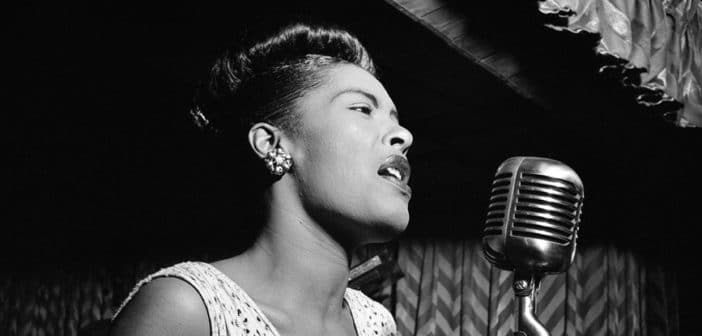 There isn’t much in the world that can hold a candle to the sultry and unique sound of Billie Holiday. My first introduction to the legendary jazz singer was through her Greatest Hits album, which was played on repeat at a clothing store I was working at in 1997. After countless listens to “Billie’s Blues” and “Gloomy Sunday,” it struck me that her deep, velvet voice and honest, poetic lyrics were iconic and representative of the times. From the Great Depression to mid-century, Billie Holiday sang for her people—anyone in pain and suffering—and most of all, herself. But even a century after she was born, the personal history of Holiday is still as inconsistent and unclear as I imagine her short life must have been.
There isn’t much in the world that can hold a candle to the sultry and unique sound of Billie Holiday. My first introduction to the legendary jazz singer was through her Greatest Hits album, which was played on repeat at a clothing store I was working at in 1997. After countless listens to “Billie’s Blues” and “Gloomy Sunday,” it struck me that her deep, velvet voice and honest, poetic lyrics were iconic and representative of the times. From the Great Depression to mid-century, Billie Holiday sang for her people—anyone in pain and suffering—and most of all, herself. But even a century after she was born, the personal history of Holiday is still as inconsistent and unclear as I imagine her short life must have been.
Humble Beginnings
Born on April 7, 1915 as Elenora Fagen (or Elinore Harris) in Philadelphia (or Baltimore) to a 13-year old mother and 15-year old father who were either married three years after her birth or never married at all, Holiday began working as a nightclub singer in New York City in 1929. It was then that she changed her name to Billie Holiday—an homage to actress Billie Dove and her alleged father, jazz guitarist Clarence Holiday. Though his paternity was often questioned—Billie’s birth certificate reportedly named Frank DeViese as her father—she looked up to Clarence as an accomplished musician and eventually, of course, followed in his career footsteps.
Trauma and Hardship
By the time Billie was 14, she had been under the care of her mother, her aunt, her aunt’s mother-in-law, a group home in Maryland and a New York State penitentiary—after she was arrested for prostitution. Upon release, Holiday began soliciting work in nightclubs—originally as a dancer but flubbed her audition—and landed a gig singing six nights a week for $2 a night.
A Star is Born
Holiday’s childhood may have been tragic but her talent was anything but. Quickly recognized by the jazz community as an up and coming star, she made her first recording with Benny Goodman in 1933— and by 1935, she was signed to Brunswick Records and landed a small role in Duke Ellington’s Symphony in Black: A Rhapsody of Negro Life.
Mainstream success began in 1939 when she received a write up in Time for her live performance at Café Society of “Strange Fruit,” a controversial song about lynching. She recorded it with Commodore Records (after Columbia turned it down) and though that version didn’t get any airplay, it was eventually re-recorded by Verve and remained in her repertoire for 20 years.
Trouble Continues
Holiday’s first marriage to trombonist Jimmy Monroe ended after six years when Holiday began having an affair with her drug dealer. Though she ended the affair and the marriage the same year, her relationship with drugs—namely heroin—and alcohol lasted until the day she died.
On May 16, 1947, just after her 32nd birthday, the singer was arrested in her apartment for possession of narcotics and sentenced to federal prison, where she did a year’s time. The consequences would have been much harsher had it not been for her career successes and public popularity. Eight months after she was released, Holiday was arrested a second time on drug-related charges.
Due to her drug convictions, Holiday was no longer able to perform at any nightclubs in New York that sold alcohol, severely affecting her ability to earn a living for the remaining 12 years of her life. Nevertheless, Holiday’s substance abuse continued to escalate and by 1952, her health was rapidly declining. She was 37 years old.
The Inevitable Fall
Holiday’s professional accomplishments continued to grow despite a noticeable deterioration in her physical appearance and voice. She toured with The Leonard Feather Package in 1954 and penned an autobiography, Lady Sings The Blues (ghostwritten by William Duffy) two years later. While she she continued to work, her later recordings show evidence of her signature sound’s loss in smoothness and elasticity. Her physical stature also began to contort, giving her the appearance of a woman well beyond her years.
Death of a Legend
By the time Billie Holiday was 43 years old, she was diagnosed with cirrhosis of the liver. She did try to stop drinking—per her doctor’s order—but wasn’t able to stay sober very long. She lost a considerable amount of weight and some of her friends tried to get her to a hospital for treatment but weren’t successful. On May 31, 1959, Holiday was taken to the hospital for liver and heart disease. She was also under investigation for drugs at the time and ended up handcuffed to her hospital bed and assigned police supervision for the remaining six weeks of her life.
On July 17, 1959, the legendary singer passed away from pulmonary edema and heart failure. She was 44 years old and had 70 cents in the bank. Addiction took another great.
Photo courtesy of William P. Gottlieb [Public domain], via Wikimedia Commons (resized and cropped)
Sponsored DISCLAIMER: This is a paid advertisement for California Behavioral Health, LLC, a CA licensed substance abuse treatment provider and not a service provided by The Fix. Calls to this number are answered by CBH, free and without obligation to the consumer. No one who answers the call receives a fee based upon the consumer’s choice to enter treatment. For additional info on other treatment providers and options visit www.samhsa.gov.




